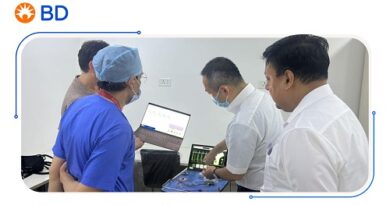Before the Brain's Whisper Turns Into a Scream for Help — Neurology Experts at Sri Ramakrishna Hospital Spreads Awareness on Neurological Health
From frequent headaches to subtle changes in mood or balance, early neurological symptoms often go unnoticed. According to neurology experts at Sri Ramakrishna Hospital, these small signs can be early indicators of larger issues affecting the brain, spine, or nerves. As a part of Neurological Health Awareness Month the neurology specialists in Coimbatore are calling for awareness, timely screening, and preventive healthcare measures that can safeguard long-term neurological well-being.
 |
Best Neurology Hospital In Coimbatore
The nervous system in the human body plays a vital role in overall functioning. It is responsible for coordinating and controlling almost the entire body functions. The brain is considered as the central power of the nervous system as it is responsible to send signals across the body through nerves. Every little function of the human body starts in the brain and is controlled by it.
The Department of Neurology at Sri Ramakrishna Hospital stands as one of the region’s foremost centers for the diagnosis, treatment, and research of neurological disorders. With a legacy of compassionate healthcare and a commitment to medical excellence, the department provides comprehensive neurological care for patients of all ages — from acute emergencies to long-term neurorehabilitation.
As this month marks the Neurological Health Awareness month, Sri Ramakrishna Hospital, emphasizes the importance of early detection and timely medical evaluation for neurological disorders — a key step toward preventing disability and improving quality of life.
Understanding Neurological Disorders
Stroke, Headache, epilepsy, multiple sclerosis, Parkinson’s disease, dementia, Nerve and muscle diseases, brain tumors, and traumatic brain injury include the important neurological disorder that we see in day to day practices.
Neurological disorders often present symptoms that are early indicators of potentially catastrophic diseases. For example patients can present with transient ischemic attack prior to a major stroke. Headache may be a presenting symptom prior to a hemorrhage stroke. Patients may have vacant spells /for just jerks before a major seizure episode. So it is important that these symptoms are understood before the catastrophic event occurs.
The Importance of Early Detection
Early signs of neurological problems often pave the way for major damage. If recognized early, they offer a window of opportunity for care and treatment, slowing disease progression, preserving function, and improving long-term quality of life.
Reversible damage: In many instances—such as in stroke, transient ischemic attacks (TIAs)—seeking timely treatment within the golden window of 4 hours could reverse any major injury or prevent further damage.
Better treatment efficiency: Treatments for many neurological work more effectively when started early, before irreversible changes have set in. This ensures the symptoms are better controlled and helps the individual to have a healthy and quality life.
Reduced complications & disability: Early care minimizes the risk of long-term disability and dependency.
Optimized rehabilitation: The earlier rehabilitation begins, the better the recovery of function — neural plasticity is greater in early phases.
Common Early Neurological Warning Signs One Should Never Ignore
Neurological symptoms may be quite mild and these are easily missed. Take a look at the signs below that should not be ignored, especially when they are consistent and worsening.
Persistent, unusual headache
Frequent or worsening headaches, especially those that differ from the usual pattern, or that come with nausea, vision changes, or neurological deficits — may be a sign of migraine, vascular issues, or intracranial lesions.
Numbness, tingling, or altered sensation
Unexplained numbness or “pins and needles” in arms, legs, face, or trunk can suggest nerve compression, neuropathy, spinal cord problems, or early multiple sclerosis.
Muscle weakness or loss of strength
A gradual or sudden decline in muscle strength — such as difficulty lifting, gripping, or walking – may point to nerve or motor neuron disorders/ Spinal problem.
Coordination or balance issues
Frequent dizziness or poor balance could indicate cerebellar, brainstem, or peripheral nerve involvement.
Changes in vision, hearing, or speech
Sudden or progressive blurry vision, double vision, hearing loss, ringing in the ears, slurred speech, or difficulty expressing thoughts often implicate neuro-ocular or cranial nerve pathways.
Cognitive or memory decline, confusion
Problems with concentration, recent memory lapses, disorientation, or sudden mood/behavior changes may suggest early dementia.
Excessive fatigue, sleep changes, or sleep disruption
Persistent lethargy, insomnia, daytime sleepiness, or abrupt sleep pattern shifts may accompany neurological disease.
Seizures or involuntary movements
A first seizure, recurrent convulsions, tremors, tics, or abnormal involuntary movements should always be assessed by a neurologist in Coimbatore.
Also remember that not every headache is serious and every symptom mentioned above indicates something serious. When experienced on a regular basis or it keeps worsening it is a wise choice to seek medical help.
Risk Factors That Raise the Chances of Neurological Disorders
While neurological problems can occur in anyone, certain risk factors increase susceptibility:
Hypertension, diabetes, hyperlipidemia can lead to conditions like stroke.
History of head trauma or concussion can raise the risk of chronic neurological sequelae.
Smoking, excessive alcohol use, sedentary lifestyle has a negative impact on vascular and neural health.
Genetic predisposition or family history of neurodegenerative disease.
Ageing can lead to many neurological disorders becoming more common with advancing age.
Autoimmune or inflammatory conditions may trigger demyelinating processes (e.g., MS).
Chronic stress, poor sleep, and uncontrolled systemic disease can worsen neurological strength.
Knowing one’s personal risk profile helps tailor treatment and screening. But remember a weak neurological health is not common with aging. For example, older people often forget things and blame it on their age, but severe memory loss is often a sign of dementia and Alzheimer’s. Get screened early for a long neurological health.
What Are The Tips To Protect One’s Neurological Health?
Here are practical steps individuals can take today:
Track and record unusual symptoms – timing, duration, progression.
Do not self-diagnose or self-medicate – always consult professionals.
Adopt a brain-healthy lifestyle – physical activity, balanced diet, good sleep.
Manage chronic conditions – hypertension, diabetes, cholesterol.
Use protective measures – helmets, seatbelts, safe environments to reduce head injury risk.
Stay mentally active – reading, puzzles, social engagement can support cognitive reserve.
Neurological problems may begin with a whisper, a fleeting sensation or subtle shift in feeling, but left unchecked, they can escalate into life-altering conditions. Ignoring early signs is a risk no one should take.
The Department of Neurology at Sri Ramakrishna Hospital is ready to serve with comprehensive diagnostics, advanced treatment options, and compassionate rehabilitation care. Sri Ramakrishna Hospital urges everyone to treat persistent or unexplained symptoms as a signal, not a mild disturbance. Reach out, seek expert evaluation, and give the nervous system the chance to heal or adapt before irreversible harm sets in. Together, let us build a more neurologically aware, supportive, and healthy community.


